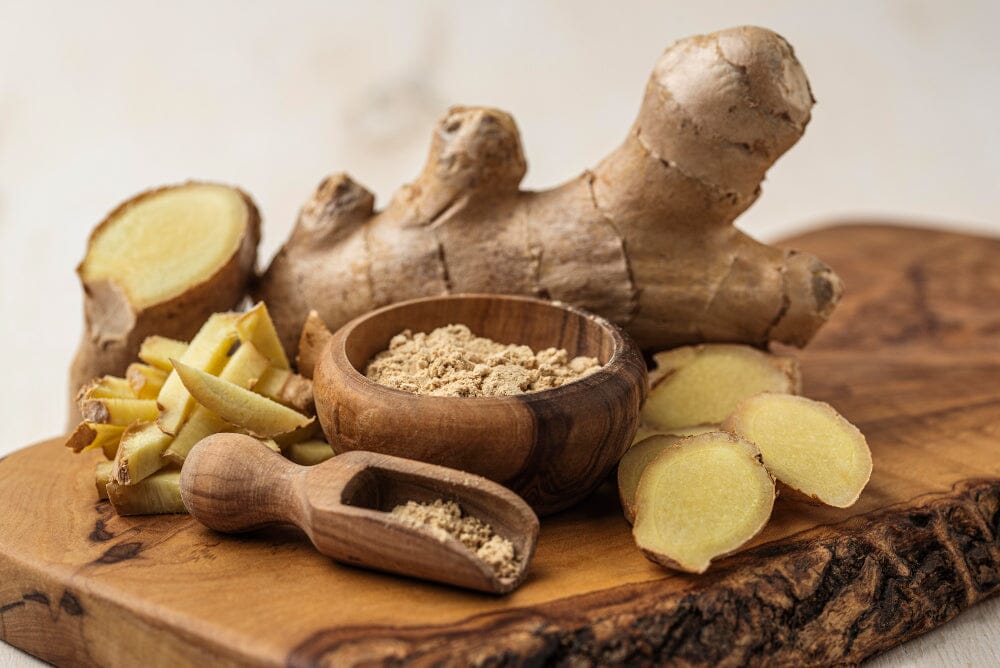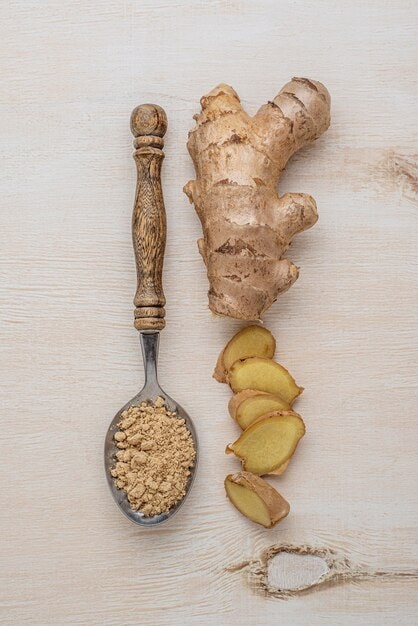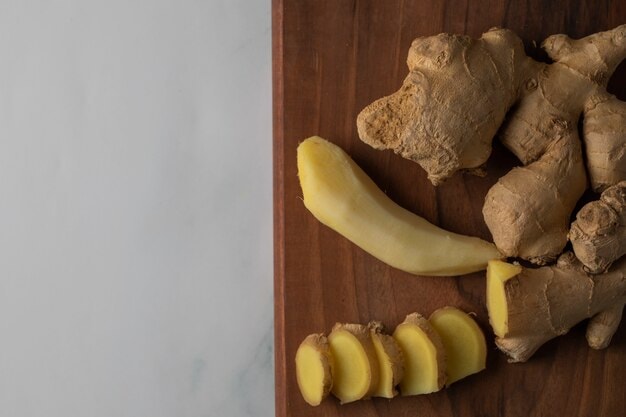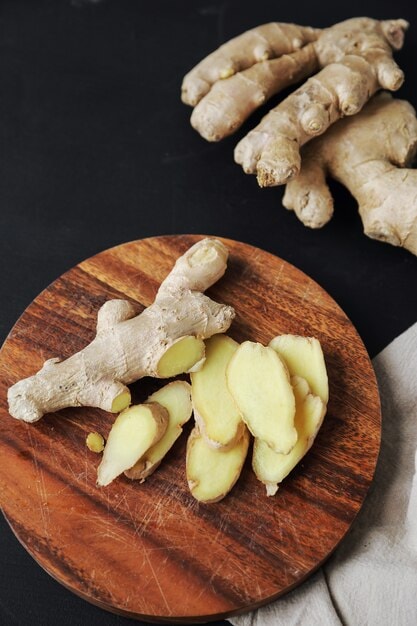
Can You Eat Raw Ginger? Studying Its Benefits and Risks
What Is Ginger?
Ginger or Zingiber officinale is the name of a root cultivated as a spice and herbal medicine.
For thousands of years, it had been valued for its special flavor and medicinal use.
Ginger is rich in bioactive compounds, particularly gingerol, that contributes to its specific aroma and health benefits.
Can You Eat Raw Ginger?

Yes, you can eat raw ginger. Fresh ginger has a concentrated dose of its health-promoting compounds.
Besides adding ginger into recipes, raw ginger can be eaten as a snack, added to smoothies, or used in teas for a more potent effect.
Health Benefits of Ginger

The health benefits of ginger have been widely studied, and this root is renowned for its therapeutic effects. Here are a few important ones:
1. Relieves Nausea and Vomiting
Ginger has proven to help in controlling nausea, such as the morning sickness in pregnant women and nausea caused by chemotherapy. The ginger compounds may have a soothing effect on the stomach, hence lessening the discomfort presented by nausea and vomiting.
2. Anti-Inflammatory Effects
One of the most well-documented properties of ginger is its anti-inflammatory effect. Compound gingerol and others reduce inflammation in the body, making it helpful for arthritis and other inflammatory conditions.
3. Enhanced Digestion
Incorporating ginger into your diet could enhance digestive functions by activating digestive enzymes and reducing stomach discomfort. Thus, it can be used in the treatment of indigestion and bloating.
4. Weight Loss Support
Ginger may help with weight loss by boosting metabolism and reducing hunger. Studies have suggested that ginger can play a role in maintaining a healthy weight when combined with a balanced diet.
5. Blood Sugar Regulation
Regular consumption of ginger has been associated with improved blood sugar levels. The effects of ginger on glucose metabolism make it a potential tool for managing diabetes, though more research is needed.
6. Heart Health
Ginger improves cholesterol levels and can lower blood pressure, reducing the risk of heart-related conditions. The anti-inflammatory and antioxidant properties of ginger are what help to confer some cardioprotective properties.
How to Add Ginger to Your Diet

Adding ginger to your diet is not difficult at all. Here are some ways of doing that.
• Slice fresh ginger and put it in teas or hot water to make ginger tea.
• Grate raw ginger and sprinkle it over salads or stir-fries.
• Mix grated ginger into smoothies for an added flavor kick.
• Mix it into soups and curries or as a marinade.
Safety and Possible Side Effects of Ginger
Despite its natural composition, high doses of ginger can cause some side effects: heartburn, gas, or diarrhea. People taking blood-thinning medication or at risk for heart conditions should talk with their healthcare provider before dramatically increasing their ginger intake.
Is Ginger Safe for All?
While mostly safe for people to consume, ginger can be very beneficial at moderate quantities. Still, its consumption by pregnant women, those suffering from bleeding disorders, or those that are prone to gastrointestinal diseases must be in small amounts.
Conclusion

Ginger or Zingiber officinale is one of the wonderful roots that have stood the test of time through cooking and medicinal use.
From ancient traditions to modern health practices, ginger is a testament to the power of natural remedies.
Its bioactive compounds, such as gingerol, have been known to cause other health benefits, so it's a very important addition to one's diet.
The question Can you eat raw ginger?
It is answered with a definitive yes, but like all other good things, moderation and awareness of its effects hold sway.
The list of health benefits due to ginger is pretty long and has the support from traditional wisdom as well as modern science.
Ginger was also applied for nausea and vomiting, especially in cases of morning sickness, motion sickness, as well as chemotherapy-induced nausea.
Thus, its anti-inflammatory properties were observed to help in relieving pain and swelling brought by chronic conditions like arthritis.
The effects of ginger on the digestive system also render it a natural remedy for bloating, indigestion, and discomfort.
In addition to the benefits that it has for the digestive system, ginger may contribute to the facilitation of weight loss and blood sugar regulation - key for general health improvement.
As a result, ginger facilitates metabolic activity, which decreases appetite, thus playing a part in the weight-reducing diets.
Such an ability to possibly regulate blood sugar levels keeps ginger in high expectations for people with diabetes or balanced diet followers.
Additionally, ginger has been associated with improved cardiovascular health by reducing cholesterol, improving circulation, and lowering blood pressure, which all add together to the prevention of heart diseases.
Yet, when looking to include the vegetable in one's diet, raw ginger offers a highly versatile and nutrient-rich option.
Raw ginger is both healthy and adaptable - it could be served sliced in ginger tea, grated over a dish, or pureed as a smoothie - and raw ginger always manages to pack concentrated health benefits into every available bite.
Thus, consuming ginger in its raw form will naturally maximize bioavailability and potency, which corresponds to current interests in consuming natural, minimally processed foods for health reasons.
However, all those benefits notwithstanding, it is pertinent to note the potential risks and side effects of ginger consumption.
Large quantities of ginger can cause nausea, heartburn, and gas or diarrhea due to an overly sensitive stomach.
High doses of ginger can interact with medications such as blood-thinning drugs, diabetes prescription drugs, and heart conditions among others.
Consulting a healthcare professional before making significant dietary changes is always advisable.
Further research is then required to discover the entire range of health benefits of ginger as well as its long-term effects.
Although the data from the most recent studies do look encouraging concerning anti-inflammatory benefits, control of weight and blood sugar levels, scientific research continues.
This means that there should always be balance in assessing claims as presented in natural remedies, such as ginger. Fresh ginger is a functional food that also gives flavor to many different preparations.
Its pungent, aromatic character generally enhances both culinary creations and nutrition.
Its function as a spice and health food makes it a staple ingredient in the kitchen of both the traditionalist and the modernist.
In addition, ginger's adaptability allows it to be consumed in more than one form: raw, cooked, powdered, or ginger tea; this can then make it easily available to many different tastes and dietary needs.
Natural remedies, like ginger, are great examples of the synergy between traditional knowledge and scientific validation.
It is a reminder that ancient practices often hold valuable insights into health and wellness.
For instance, using ginger for nausea and inflammation has been observed and supported over centuries; now, it has been validated by science.
Such a continuity between past and present only shows how ginger is relevant in human life forever.
For those seeking to live healthier lifestyles, adding grams of ginger to your diet is a easy but impactful step.
Whether you want to find relief from digestive distress; lose weight naturally; or control blood sugar levels, ginger has been shown to be helpful.
As a versatile anti-inflammatory and antioxidant, it may help neutralize oxidative stress - the primary cause of chronic diseases.
In other words, ginger is an excellent agent in the pursuit of healthy and well-being but not a panacea.
As a result, although there is much evidence regarding the positive effects of ginger on nausea, inflammation, and heart health, it has to be used thoughtfully and with balance.
Moderation is key because high intake levels can be detrimental due to resulting side effects when taken by those suffering from diseases or medication.
As you add ginger thoughtfully to your diet, you can tap into its possible benefits with minimal risk.
Ultimately, ginger is more than just a spice; it is an example of the potential that lies with natural remedies towards supporting human health.
As science continues uncovering the effects of ginger in aspects of wellness, it's evident that this humble root holds much promise.
Whether it is eaten raw, used in tea, or as a flavoring agent in your favorite food, ginger is a versatile and health-promoting ingredient that deserves a place within your daily routine.
It is great to appreciate ginger for its flavor and therapeutic properties. Here is an end to being natural, all the while savoring delicious healthy habits.
A spice that originated as herbal medicine in ancient times, ginger has been recognized as one of today's superfoods.
And if you're still pondering the question of whether you can consume raw ginger or not, then yes, you absolutely can, and it would be highly rewarding to do so.
FAQ
1. Can you eat raw ginger, and what are the benefits?
You can eat raw ginger. Raw ginger is rich in nutrients and bioactive compounds such as gingerol, which explains the wide range of health benefits obtained from eating the spice.
To deal with nausea and vomiting, improve your digestive process, reduce your inflammation, regulate blood sugar levels, and help to achieve weight loss through increasing the rate of metabolism and therefore suppressing appetite, you could simply eat raw ginger.
Since cooking sometimes impairs the effects of raw ginger, its maximum potency of its natural compounds is ensured.
Adding raw ginger to your diet is easy. Chewing the little slices, grating on food, or smoothies are all that you require, but moderation will avoid side effects-especially on sensitive stomachs.
2. What is ginger and why is it considered so good?
Ginger is one of the root of spice in the category of Zingiber officinale. It is a plant that comes from Southeast Asia and has been applied there for years for medication purposes due to its properties to help health.
Ginger contains a high amount of bioactive compounds that contribute to the anti-inflammatory, antioxidant, and digestive advantages.
The health benefits of ginger are numerous, including nausea reduction and heart health support.
Being one of the most versatile ingredients of both culinary value and natural remedy, ginger adds crucial value to many diets around the world.
Whether eaten raw, brewed into tea, or used to cook, ginger offers countless health benefits based on both tradition and modern science.
3. How does ginger help with nausea and vomiting?
Ginger has been established to reduce nausea and vomiting very effectively making it a popular treatment for multiple conditions.
The compounds in ginger may affect the stomach by calming and soothing the organ and thus reduce feelings of queasiness.
Studies demonstrated that ginger can work exceptionally well on pregnant women with morning sickness, motion sickness, and chemo-induced nausea.
You can chew on raw ginger, sip ginger tea, or take small doses of fresh ginger to alleviate nausea.
For nausea associated with travel, carrying a small piece of raw ginger or ginger candies can be especially helpful.
However, if you’re pregnant or undergoing medical treatment, consult your doctor before using ginger as a remedy.
4. Does eating raw ginger have any side effects?
While ginger is usually safe for most people, high dose consumption of ginger leads to side effects.
These include heartburn, gas, bloating, or diarrhea, especially for people whose stomachs are sensitive.
High doses of ginger may also cause blood thinning, increasing the risk of bleeding in people on anticoagulant medication or with bleeding disorders.
As this is a rather unfamiliar flavor for many, you can start small and assess your tolerance. Avoid going above 4 grams per day.
Women with a pregnancy condition or having gallstones, or those who have an underlying health condition, should first discuss large doses with their doctor.
5. Can ginger be used as an aid in weight loss?
Indeed, ginger may complement weight loss where other measures will have been properly balanced in diet and exercise.
This is because bioactive compounds, such as gingerol, boost metabolism, heighten fat burn, and reduce hunger and stimulate appetite.
The results also indicate that ginger has some effect on regulating blood sugar levels, which is a very important key to healthy weight management.
It is very easy to incorporate ginger into your diet. Start your morning with a warm cup of ginger tea, toss fresh ginger into salads, or blend it into smoothies.
While ginger cannot alone lead to meaningful weight loss, it can be a fine addition to a broader weight management plan.
6. How does it improve digestion?
Many know of the digestive advantage ginger possesses. It stimulates the production of digestive enzymes, breaks down food more efficiently, and reduces bloating and gas.
Effects of ginger on digestion also calm stomach linings, making it an excellent remedy for indigestion or a bad stomach.
You can also include ginger in your digestive routine by chewing on a small piece of raw ginger before meals or drinking ginger tea after eating.
These compounds-include gingerol and shogaol, which also work synergistically to encourage health and comfort in your gastrointestinal tract.
7. Does ginger help in blood sugar control?
Yes, ginger has been associated with improved blood sugar control. Studies suggest that ginger may help increase insulin sensitivity, lower fasting blood sugar levels, and reduce the risk of complications associated with diabetes.
The effects of ginger on blood sugar regulation are particularly beneficial for individuals with type 2 diabetes.
To benefit from these, it is possible to add small amounts of raw ginger in your daily diet. It can be added in tea, smoothies, or salads.
Whatever the method, fresh ginger can be easy and natural support for healthy blood sugar levels.
Yet, much more work needs to be done on this to determine its long-term effects on blood sugar management.
8. Does ginger help in body inflammation?
Ginger is an anti-inflammatory natural substance because it possesses various compounds such as gingerol and shogaol.
These compounds prevent the inflammatory pathways in the body, so ginger is used to manage chronic inflammatory diseases that range from arthritis to osteoarthritis and can even reduce muscle soreness after exercise.
Regular consumption of ginger can reduce inflammation and pain, overall, thereby promoting good joint health and mobility.
Fresh ginger, ginger tea, or powdered ginger can be used as part of an anti-inflammatory diet. However, those suffering from very severe inflammatory conditions should consult with a healthcare provider for advice.
9. How can you incorporate fresh, raw ginger into your diet?
Adding raw ginger to your diet is easy and versatile. Here are a few ideas:
•Ginger tea: Slice fresh ginger and steep it in hot water for a soothing drink.
•Smoothies: Blend fresh ginger with fruits and greens for a flavorful health boost.
•Salads: Grate raw ginger and sprinkle it over salads for a zesty kick.
•Snacks: Chew on small slices of raw ginger for an instant pick-me-up.
•Culinary : Grind fresh ginger onto stir-fries, soups, or marinades for a punch of flavor.
Consuming raw ginger in dishes benefits in both its potency as well as how it will help with your health. This can be determined by experimenting with different recipes that may work the best.
10. Who should not consume raw ginger and why?
While safe for most, there are certain individuals who should be cautious about ginger.
People who have blood-thinning medication like warfarin or those with bleeding disorders should take smaller amounts of ginger since it may be a risk factor for bleeding.
Pregnant women should also consult with a doctor on the use of massive amounts of ginger because it may pose potential risks during pregnancy.
They should also consult a doctor if they suffer from gallstones or some severe gastrointestinal conditions before consuming high doses of ginger.
Moderation is the key to the benefits of ginger without experiencing adverse side effects.
* Medical Disclaimer - The following information is for educational purposes only. No information provided on this website, including text, graphic, and images, are intended as substitutes for professional medical advice. Please consult with your doctor about specific medical advice pertaining to your condition(s).






